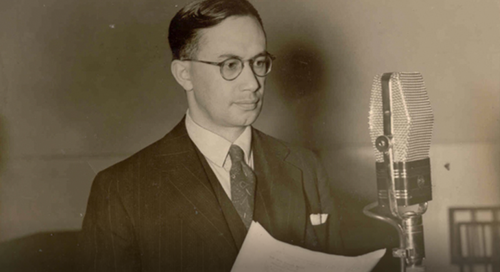
William (Wiremu) Leonard Parker (1914-1986) - Ngāti Porou (Image: Ngā Taonga Sound & Vision Collection)
Wiremu Parker - Eulogy for Sir Apirana Ngata
Wiremu Parker was born near Waipiro Bay on the East Coast of New Zealand’s North Island. He was schooled at Hiruharama Native School and attended Te Aute College in Hawke’s Bay from 1930-1936 where he was a prefect and captain of the First XV rugby team, often working the school farm during school holidays to help offset his school fees.
He had a strong sense and deep belief in Māori traditions from attending numerous hui and listening to authoritative Māori and Pākehā leaders whose knowledge commanded respect. He became a mediator between Māori and Pākehā as well as the old and modern Māori worlds from listening to role models like Apirana Ngata.
In 1937 Parker began studies for a BA degree at Victoria University in Wellington with the son of Apirana Ngata, Hēnare, before leaving to join the Department of Education in 1938. He was an avid and model speaker as well as writer of te reo Māori. He was appointed the first official Māori news broadcaster following recommendations to cabinet from Māori members of the house.
A skilled journalist, he became a household name and well known to Māori audiences due mainly to his weekly broadcasts of war news, casualties lists of the 28th Māori Battalion and general Māori news in te reo. Sadly, due to wartime restrictions, none of these bulletins were recorded or have survived in the archives.
He tells told a wonderful story of being instructed by the Bishop of Aotearoa Frederick Bennett to give an impromptu eulogy during one of his broadcasts, to an elder who had recently passed away. However, this was, contrary to instructions from his broadcasting directors to “stick to the script”. He gave the eulogy in te reo, and on On “ ‘fessing up”, his actions found favour and support from his chief reporter, the Director of Broadcasting and he was permitted more freedom in his broadcasts from then on.
Parker narrated broadcasts of the return of the 28th Māori Battalion in January 1946 as well as farewelling Sir Apirana Ngata on his death in 1950. From 1964 he assisted in producing, and presented, the NZBC weekly series The Māori Programme, and also lectured in Māori language and culture at Wellington’s Victoria University. In 1981 he worked with David Somerset as a consulting editor and contributor on radio programmes eventually publishing the booklet and three accompanying audio tapes Whaikōrero; ceremonial farewells to the dead.
On his deathbed in 1986, Parker was awarded an Hon D. Lit. from Victoria University and further recognised in 1988 by the establishment of Te Tohu Whakamaumaharatanga ki a Wiremu Parker (Wiremu Parker Memorial Award) that reflects his fields of endeavour and interest. He rests at Te Puni cemetery in Petone.
In this clip Parker gives his eulogy to Sir Apirana Ngata, which was broadcast nationwide on 14 July 1950.
This is an excerpt from the recording 'Eulogy to Sir Apirana Ngata' (25961).
Listen to more broadcasts of Wiremu Parker (English).
Collection reference 25961
Year 1950
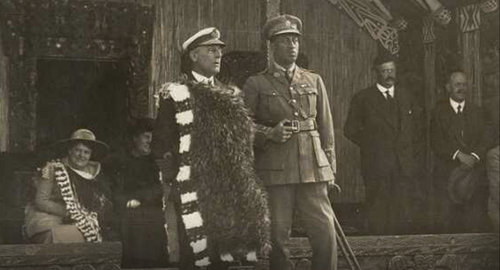
Kēpa Hamuera Anaha Ehau (1885-1970) - Ngāti Tarawhai, Ngāti Whakaue (Image: Governor General, Lord Jellicoe, addressing Arawa Maori at Whakarewarewa with Kēpa Ehau, 1921 - Alexander Turnbull Library, PAColl-8900)
Kēpa Ehau - Orator of the Airwaves
Although state radio took many years to embrace te reo Māori as a regular part of broadcast programming, there were occasions when recognised Māori orators would come to the studios and record broadcasts in te reo, often to mark significant national events.
These were men such as Kēpa Hamuera Anaha Ehau (1885-1970, Ngāti Tarawhai, Ngāti Whakaue) who was recognised as not just the leading orator of Te Arawa, but also as one of the great Māori speakers of his generation.
He was a government-licensed interpreter and was frequently recorded by his local radio station, Rotorua 1YZ/1ZC throughout the 1950s and early 1960s. He made short radio programmes on Rotorua history and legends, recorded farewell tributes to King George VI and Prime Minister Peter Fraser and welcomed the new queen, Elizabeth II when she was crowned in 1953. These nationally significant oratories in English and te reo Māori were broadcast nationwide.
This recording is his tribute to Prime Minister Peter Fraser on his passing in 1950.
Collection reference 33029
Year 1950
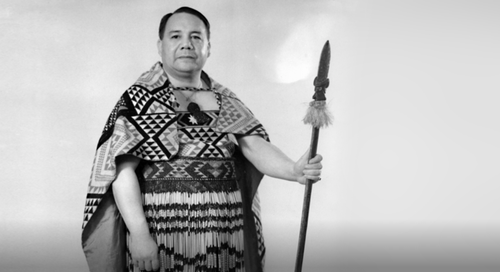
Te Aritaua Pitama (1906-1958) - Ngāi Tahu, Ngāti Mamoe (Image: Ngā Taonga Sound & Vision collection)
Te Aritaua Pitama, Whakatauki and Waiata
Te Aritaua Pitama was born at Tuahiwi north of Kaiapohia, North Canterbury, the eldest of 12 children. His principle hapū were Ngāi Ruahikihiki, Ngāi Tūāhuriri, Ngāi Te Rakiamoa and Ngāti Hinematua of the Ngāi Tahu and Ngāti Mamoe iwi from the South Island of Aotearoa/New Zealand.
Fluent in English and te reo Māori, (unusual for southern Māori at the time), he was tutored in whakapapa and Ngāi Tahu traditions by his mother Manakore and Ngāi Tahu historian and scholar Teone Taare Tikao. Pitama was schooled at Tuahiwi Primary School and Christ’s College till until 1924 when he began teaching at Rātana Pā School with his mother, before working at a Palmerston North newspaper.
Returning to Tuahiwi in 1934 he worked as a labourer and despite his youth at 28 years of age, he was considered a kaumatua and was one of the orators who welcomed the spiritual leader Tahupōtiki Wiremu Rātana when he visited Tuahiwi to attend the tangi of his son Ārepa who had married into Ngāi Tahu.
Pitama invited The Duke of Gloucester to visit Tuahiwi and was put in charge of arranging the Māori reception when the Duke visited Christchurch during his 1934-35 visit. Following the Rātana movement and Labour Party political alliance he was an election organiser as a member of the party’s Māori Organising Committee for Eruera Tirikātene who was standing for the Southern Māori seat.
In this programme, Pitama explains place names and proverbial sayings with waiata Māori lifting on-air Te Reo Māori content, in the only widely accepted way permissible at the time.
Collection reference 55767
Year 1952
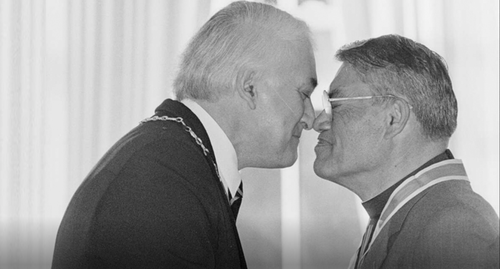
Kīngi Matutaera Ihaka (1921-1993) - Te Aupouri (Image: Governor General, Sir Paul Reeves, at the investiture of Archdeacon Sir Kingi Ihaka - Alexander Turnbull Library, EP/1989/1785/10-F)
Rev. Kīngi Ihaka: Orator of the Airwaves
Another regular ‘part-time’ broadcaster in te reo Māori was Anglican minister Reverend (later Archdeacon Sir) Kīngi Matutaera Ihaka (1921-1993, Te Aupouri.) Like Kēpa Ehau, he was also a licensed interpreter and while working in parishes around the Lower North Island in the 1950s, he would visit the Wellington studios of the Broadcasting Service and record a variety of programmes, including the example here, recorded in 1954: a series about whakatauaki or traditional Māori proverbs.
Later, when he was based in Wellington, Kīngi Ihaka appeared regularly on Wiremu Parker’s English language Māori Programme and in 1966 he was appointed to the N.Z.B.C. advisory committee. His promotion to Archdeacon meant he was also often recorded for radio while speaking at many hui and church services and his involvement in public life meant he was often a ‘go-to’ radio interviewee on many topics in ‘te ao Māori’.
Collection reference 177780
Year 1954
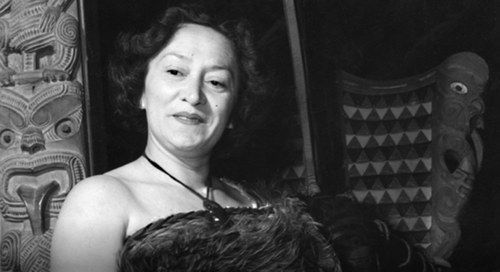
Airini Ngā Roimata Grennell (1910-1988) - Ngāti Tama, Ngāti Mutunga, Ngāi Tahu (Image: Ngā Taonga Sound & Vision Collection)
Airini Grennell Signs In
Born in 1910 on the Chatham Islands, Grennell moved with her family to Banks Peninsula on the eastern seaboard of New Zealand’s South Island at the age of 10. Schooled at Sacred Heart Girls’ College in Christchurch she represented Canterbury in golf and netball. In her late teens, her keen interest in music saw her travel to England for professional training earning LTCL and LRMS diplomas in teaching both singing and piano.
On her return to Aotearoa/New Zealand, Airini and her family formed part of the Koukourarata concert party performing to raise funds for local communities during the economic depression of the late 1930s. She was an integral part of the Waiata Māori Choir with influential people like Te Uira Manihera and Inia Te Wiata. The choir was organised by the renowned clergyman Rev. A.J. Seamer. Travelling through Australia, England and India the group finally wound up their performances in 1938. She was affectionately known as the “Chatham Islands Nightingale”.
In this item Airini Grennell signs in and greets audiences in te reo Māori.
Collection reference 145841
Year 1958